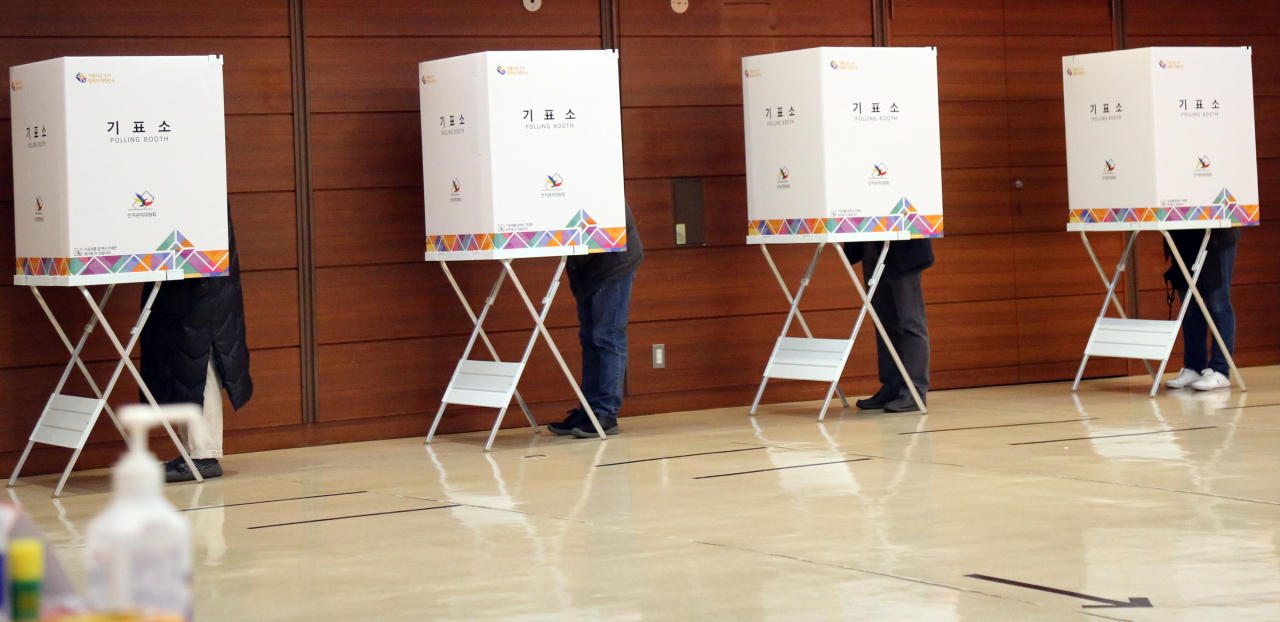 |
Overseas Koreans vote to elect the 20th president at the Korean Embassy’s overseas polling station in Tokyo, Japan on Wednesday. (Yonhap) |
As the 20th presidential election for overseas Koreans begins on Wednesday, presidential candidates compete to win over expat voters, pledging to establish the overseas Korean office and improve the current inconvenient election system.
Overseas elections take place at 219 polling stations at 177 diplomatic missions in 115 countries worldwide. There are 226,152 registered overseas voters.
First voting starts with the New Zealand Embassy and Auckland branch at 4 a.m. on Wednesday. In the case of the Ukrainian embassy, a poll is not conducted as election affairs are suspended due to the crisis with Russia.
Eleven percent of the estimated 2 million overseas voters registered to vote for this election. Among the absentee voters are 196,980 Koreans staying abroad for a short time, such as international students and business expatriates, and 29,182 Koreans who have settled overseas. By country, the US has 53,073 voters, China 29,827, Japan 28,816, Vietnam 14,362, Canada 12,391, Germany 9,797 and Australia 8,039.
Politicians are trying to capture the votes of overseas voters by making pledges that support them.
Lee Jae-myung, the presidential candidate of the ruling Democratic Party of Korea, appealed for their support on Wednesday, saying, “We will make Korea a greater country for our overseas Koreans.” He proposed enacting a framework act on overseas Koreans and establishing an office for overseas Koreans. He also vowed to introduce a postal voting system to guarantee the suffrage of overseas Koreans.
Yoon Suk-yeol, the candidate of the main opposition People Power Party, said on the same day, “We will expand support for educational programs such as those for Hangeul (Korean language) schools and establish an office for overseas Koreans to improve the overseas election system.”
Ahn Cheol-soo of the People’s Party promised to operate a permanent overseas national committee under the direct control of the president, while Sim Sang-jung of the Justice Party also pledged to establish an overseas Korean office.
The ruling Democratic Party of Korea and main opposition People Power Party criticized each other to woo overseas voters.
Kang Byung-won, a senior spokesman for the Democratic Party of Korea, said in a commentary, “The People Power Party has opposed various voting methods for overseas Koreans to participate. As a result, the introduction of the postal voting system has been canceled.”
Hwang Kyu-hwan, a spokesman for the People Power Party, said, “I understand that you are worried about the crisis on the Korean Peninsula and the diplomatic and security situation surrounding Korea (due to the current administration).” He added that his party will ensure making a “safer Korea” and “realize reliable security.”
Overseas elections are a system that allows Korean nationals staying or living abroad to participate in presidential or parliamentary elections. It was first implemented in the 19th general election in 2012 after revising the Public Official Election Act, which was passed in the National Assembly in 2009.
However, the turnout has been low due to the low number of polling stations abroad. Last month, lawmakers voted to amend the Public Official Election Act to allow additional overseas voting stations to be installed in areas with more than 30,000 overseas Koreans.
By Shin Ji-hye (
shinjh@heraldcorp.com)






![[Out of the Shadows] Seoul room clubs offer drugs to compete for clientele](http://res.heraldm.com/phpwas/restmb_idxmake.php?idx=644&simg=/content/image/2024/11/05/20241105050566_0.jpg)

